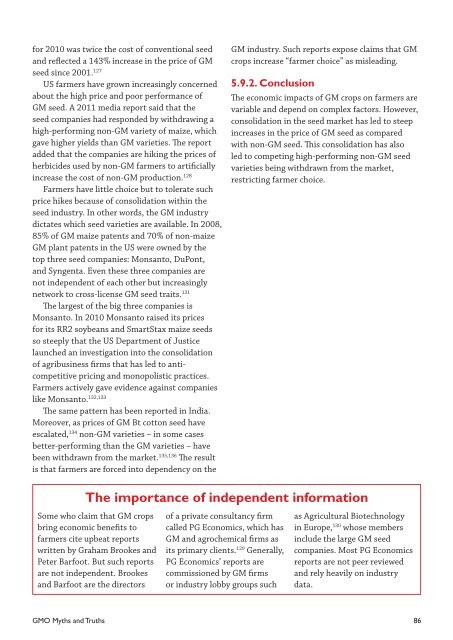GMO Myths and Truths
GMO Myths and Truths
GMO Myths and Truths
You also want an ePaper? Increase the reach of your titles
YUMPU automatically turns print PDFs into web optimized ePapers that Google loves.
for 2010 was twice the cost of conventional seed<br />
<strong>and</strong> reflected a 143% increase in the price of GM<br />
seed since 2001. 127<br />
US farmers have grown increasingly concerned<br />
about the high price <strong>and</strong> poor performance of<br />
GM seed. A 2011 media report said that the<br />
seed companies had responded by withdrawing a<br />
high-performing non-GM variety of maize, which<br />
gave higher yields than GM varieties. The report<br />
added that the companies are hiking the prices of<br />
herbicides used by non-GM farmers to artificially<br />
increase the cost of non-GM production. 128<br />
Farmers have little choice but to tolerate such<br />
price hikes because of consolidation within the<br />
seed industry. In other words, the GM industry<br />
dictates which seed varieties are available. In 2008,<br />
85% of GM maize patents <strong>and</strong> 70% of non-maize<br />
GM plant patents in the US were owned by the<br />
top three seed companies: Monsanto, DuPont,<br />
<strong>and</strong> Syngenta. Even these three companies are<br />
not independent of each other but increasingly<br />
network to cross-license GM seed traits. 131<br />
The largest of the big three companies is<br />
Monsanto. In 2010 Monsanto raised its prices<br />
for its RR2 soybeans <strong>and</strong> SmartStax maize seeds<br />
so steeply that the US Department of Justice<br />
launched an investigation into the consolidation<br />
of agribusiness firms that has led to anticompetitive<br />
pricing <strong>and</strong> monopolistic practices.<br />
Farmers actively gave evidence against companies<br />
like Monsanto. 132,133<br />
The same pattern has been reported in India.<br />
Moreover, as prices of GM Bt cotton seed have<br />
escalated, 134 non-GM varieties – in some cases<br />
better-performing than the GM varieties – have<br />
been withdrawn from the market. 135,136 The result<br />
is that farmers are forced into dependency on the<br />
GM industry. Such reports expose claims that GM<br />
crops increase “farmer choice” as misleading.<br />
5.9.2. Conclusion<br />
The economic impacts of GM crops on farmers are<br />
variable <strong>and</strong> depend on complex factors. However,<br />
consolidation in the seed market has led to steep<br />
increases in the price of GM seed as compared<br />
with non-GM seed. This consolidation has also<br />
led to competing high-performing non-GM seed<br />
varieties being withdrawn from the market,<br />
restricting farmer choice.<br />
The importance of independent information<br />
Some who claim that GM crops<br />
bring economic benefits to<br />
farmers cite upbeat reports<br />
written by Graham Brookes <strong>and</strong><br />
Peter Barfoot. But such reports<br />
are not independent. Brookes<br />
<strong>and</strong> Barfoot are the directors<br />
of a private consultancy firm<br />
called PG Economics, which has<br />
GM <strong>and</strong> agrochemical firms as<br />
its primary clients. 129 Generally,<br />
PG Economics’ reports are<br />
commissioned by GM firms<br />
or industry lobby groups such<br />
as Agricultural Biotechnology<br />
in Europe, 130 whose members<br />
include the large GM seed<br />
companies. Most PG Economics<br />
reports are not peer reviewed<br />
<strong>and</strong> rely heavily on industry<br />
data.<br />
<strong>GMO</strong> <strong>Myths</strong> <strong>and</strong> <strong>Truths</strong> 86


